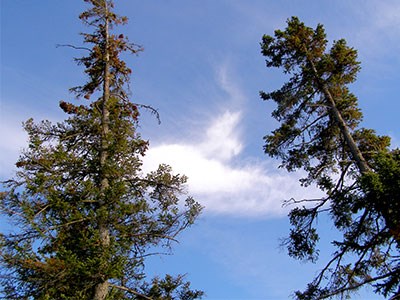The Ministry of Natural Resources (MNR) is still aiming for a spring startup date to roll out a new Crown forest agency on the north shore of Lake Superior.
After the Ontario government announced the formation of the Local Forest Management Corporation (LFMC) for the Marathon area last May, Natural Resources Minister Michael Gravelle wanted the agency to be operational by April 1.
Mark Speers, the ministry's director of forest tenure and economics branch, said there's “a mountain” of organizational work to be done before that happens.
“This is a really complex deal with five management units that could be involved and different scenarios with some of them being Crown management units and some held by SFLs (Sustainable Forest Licences). There's a lot of detailed transitional work.”
Dubbed the Nawiinginokiima Forest Management Corporation, the new agency will market and oversee the sale of Crown timber in the forest around Marathon, Manitouwadge and the Pic Mobert First Nation.
The corporation will govern about two million cubic metres of fibre on five management units: the Nagagami, White River, Big Pic, Black River, and the Pic River Ojibway forests.
The LFMC is one of two pilot models the Ontario government is experimenting with. It will deliver more local, hands-on control over Crown forests in a given area.
The corporation is a stepping stone in a much-needed overhaul of the province's wood supply system that allowed forestry companies to keep their timber rights and hoard wood even though their operations had been long since ceased.
Instead of dealing with the government, companies seeking to secure a long-term commitment of Crown fibre will have to deal with this agency.
The corporation will deal with companies like Haavaldsrud Timber, Lecours Lumber, Columbia Forest Products, and a new player on the scene, India's Birla Group, now in charge of the former Terrace Bay Pulp mill. Those companies will take up a sizeable chunk of the available fibre.
“The LFMC is going to enter into business contracts with all of those players, that's going to be their role,” said Speers. “To the extent that those players don't use the available supply, then (the corporation will) be charged with trying to market the rest of it to other players.
“There are existing wood supply commitments on the landscape but even though they're there, they have to be negotiated with the LFMC; the scheduling, harvesting, pricing, all of those things have to be negotiated.”
The corporation will be a largely community-driven entity with a board of directors predominately drawn from the local populace.
Interviews were being conducted in the fall. The ministry wants a range of expertise in forestry, finance, management, law, business, human resources and environmental science. Once in place, that board must find its general manager.
The corporation's activities and salaries will be supported through the sale of Crown timber. Speers forecasts that could be between $1 million and $1.5 million, depending on how much wood moves to the mills.
The new corporation reports directly to Gravelle, but its degree of autonomy to make business decisions depends on adhering to MNR policy, such as conforming to the Crown Forest Sustainability Act.
For example, if the corporation proposed driving a logging road from a harvest site to a highway or mill, it means following the same approvals process as any other company, said Speers, such as following forest management guidelines for protecting wildlife and fish habitat, and remote tourism.
“They'll be responsible for making sure that they follow the legislation, the regulations and existing policy. They're like any other company that holds a (forest) licence.”
Speers said the possibility of a spring provincial election shouldn't derail the process once the permanent board is in place.
“It could be a little bit of a slow-down in terms of transferring or issuing licences if there's an election called, but we'll have lots of work to do to prepare for beyond that.”




